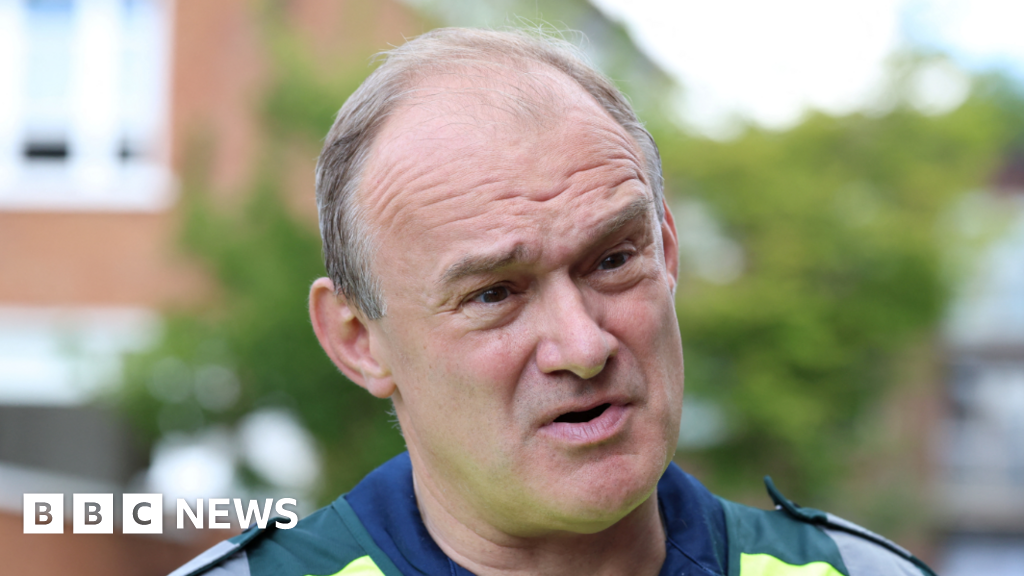- Author, Kate Whannel
- Role, Political reporter
-
Sir Ed Davey has called for a review of betting laws, following revelations that parliamentary candidates are being investigated by the Gambling Commission for alleged bets on the election.
The Liberal Democrat leader said he had previously bet on the outcome of elections but drew a distinction between what he described as “having a flutter” and having inside knowledge before placing bets.
However, Labour leader Sir Keir Starmer said the current rules were “clear enough” and that the problem was with politicians’ behaviour.
Work and Pensions Secretary Mel Stride has said there should be a “proper and thoughtful debate” on the subject but cautioned against a “knee-jerk” reaction.
BBC Newsnight has learned that as many as 15 Conservative Party candidates and officials are being scrutinised by the Gambling Commission.
It is understood the regulator will be carrying out interviews this week.
Prime Minister Rishi Sunak and Sir Keir are likely to face questions on the subject when they face each other at a BBC debate to be broadcast at 20:15 on BBC One and on BBC iPlayer.
Scottish Secretary Alister Jack is not being looked into by the commission but has admitted to placing three bets on the election date.
Mr Jack, who is not standing to be an MP in the 4 July election, told the BBC that in April he placed a successful bet that the election date would fall between July and September – after losing two similar bets in March.
He said his wagers, which included two unsuccessful £5 bets and one successful £20 bet, did not breach any rules.
Asked about Mr Jack’s case, Mr Stride told BBC Radio 4’s Today programme his colleague had been “very clear” that he “hasn’t broken any of the rules or used any inside information”.
He said there needed to be a “thoughtful debate” on the general subject adding that there was “a huge difference between a politician placing a bet on what government we’ll have in 10 years’ time and someone who does something that’s more immediate – or relates for example to their own seat”.
The minister argued the focus should be on rule-breaking and that there should be “very severe consequences” if people are found to have committed wrongdoing.
Asked by Times Radio whether politicians should bet on political events, Mr Stride said: “My personal view, I would just say that people shouldn’t do it.”
Sir Keir said he thought the rules were “clear enough” and did not need to change, later adding that it was the “culture of politics” that needed to change.
“You can see why the Tories want to take this debate to should the rules change because that takes the focus away from the real issue which is the behaviour of politicians.”
He said he had acted quickly over the case of Mr Craig and accused Mr Sunak of waiting “days and days” before withdrawing support from his candidates.
The Labour leader said he had placed bets on horses but never on politics.
Sir Ed told the BBC he had placed a bet on how well his party would do in the 2010 election but lost.
He also told ITV he had bet on the 2022 by-election in North Shropshire, which his party won.
“But I think lot’s of people in politics do this. One reason why we need this review of gambling regulations is to get real clarity on what is allowed but what isn’t,” he said.
The comments came after a hectic Tuesday evening which saw both Labour and the Conservatives withdrawing support for their candidates.
In a statement, Mr Craig said he “did not place this bet with any prior knowledge of the outcome” and had planned on “giving any winnings to local charities”.
“This was a huge mistake, for which I apologise unreservedly,” he added.
Mr Craig did receive support from Conservative parliamentary candidate for Bournemouth West, Conor Burns.
In a social media post, he said: “I can’t help wonder if Labour have overreacted over their candidate Kevin Craig who could not have had any inside information or really influenced the outcome of his bet – any more than any candidate can determine a free vote.”
Following his party’s decision to withdraw support, Mr Williams – a close aide to the prime minister as well as a candidate in Montgomeryshire and Glyndŵr – said he remained “committed” to his campaign.
He added that he had committed “an error of judgement” but not “an offence”.
Last week, a spokesperson for Ms Saunders said she would be co-operating with the Gambling Commission and had nothing further to add.
The candidates will appear on ballot papers, but could become independent if elected, pending the result of an investigation.

